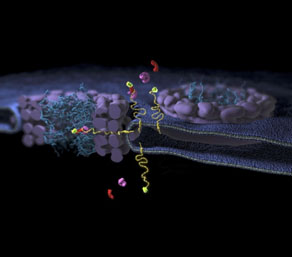The transport of integral membrane proteins across the nuclear pore complex

Figuur: het membraaneiwit (geel) zit verankerd in de membranen. De transporteiwitten (rood, paars) herkennen het adreslabel en de linker wordt uitgerekt. De transporteiwitten binden in het centrum van het kernporiecomplex en de linker wiebelt door de structuur.
Promotie: dhr. A.C. Meinema, 16.15 uur, Academiegebouw, Broerstraat 5, Groningen
Proefschrift: The transport of integral membrane proteins across the nuclear pore complex
Promotor(s): prof.dr. B. Poolman
Faculteit: Wiskunde en Natuurwetenschappen
Transport van membraaneiwitten over het kernporiecomplex
Voor de functie van verschillende eiwitten is het belangrijk om op het juiste moment op de juiste plaats in de cel te zijn. Dit is goed onderzocht voor eiwitten die vrij in het cytoplasma van de cel rondbewegen en naar de celkern worden getransporteerd. Deze eiwitten bevatten een signaal- of adrescode. Specifieke transporteiwitten herkennen deze adrescodes en brengen de eiwitten van het cytoplasma naar de celkern. Dit transport tussen het cytoplasma en de celkern gaat via de kernporiecomplex.
Het was echter nog onbekend hoe membraaneiwitten de kern in worden getransporteerd. In zijn proefschrift laat Anne Meinema zien dat de adrescode bij membraaneiwitten via een lang ongevouwen linkdomein aan het eiwit is verbonden. De flexibele linker kan gemakkelijk uitgerekt worden, zodat de adrescode bij het membraan vandaan kan bewegen. Hierdoor hebben transporteiwitten, als ze aan de adrescode gebonden zijn, de vrijheid om het centrum van de kernporiecomplex te bereiken en zo de kern in te worden getransporteerd. Het transporteiwit trekt dus als het ware aan linker om het membraaneiwit, dat in het membraan blijft zitten, over het kernporiecomplex te transporteren. Hiervoor snijdt de linker door de structuur van de kernporie complex heen (zie figuur). Dit is een nieuw model dat het transport van membraaneiwitten naar de celkern beschrijft.
Anne Meinema (Emmeloord, 1982) studeerde moleculaire biologie en biotechnologie in Groningen. Het onderzoek werd uitgevoerd bij de vakgroep membraan enzymologie en gefinancierd door NWO. Meinema gaat met onderzoek als postdoc bij de groep Moleculaire Systeem Biologie.
Meer nieuws
-
17 februari 2026
De lange zoektocht naar nieuwe fysica
-
10 februari 2026
Waarom slechts een klein aantal planeten geschikt is voor leven
